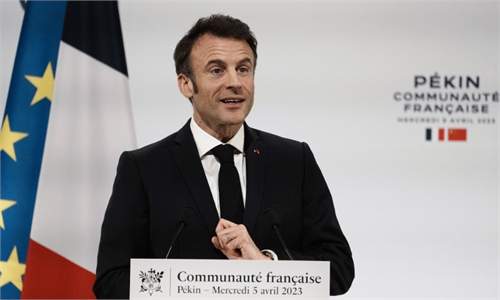
Illustration: Tang Tengfei/Global Times
News reports suggested recently that French President Emmanuel Macron has reportedly asked South African President Cyril Ramaphosa for an invitation to the BRICS Summit scheduled for August, a news story that has not yet been confirmed by either French or South African authorities. But it has caused quite a stir in the field of public opinion, as this is the first time that a leader of the G7 developed countries has reportedly sought to attend a BRICS summit, especially against the background of the Russia-Ukraine conflict.
Some observers, who are familiar with Macron, tend to believe the report as no great shock.
To begin with, the importance of the BRICS is increasing. The five countries in the BRICS cover 26 percent of the total land area on earth, and have a combined population of 3.24 billion people, which is over 40 percent of the world. Not to mention the BRICS five now contribute 31.5 percent of global GDP, while the G7 share has fallen to 30 percent. Before next summit, BRICS has drawn membership bids from 19 countries, which reflects its significance on potential for growth, market, and opportunities.
At the same time, the role of the Global South is also becoming increasingly prominent. Throughout the Russia-Ukraine conflict, the West, including France, has been piling more and more sanctions onto Russia. However, they have found that many developing countries have not taken their side as they had hoped for, but instead have remained neutral and called for an early end to the conflict and a ceasefire. The 59th Munich Security Conference, held earlier this year, focused on giving voice to countries of the Global South. It indicates that the West is feeling a sense of crisis and is concerned about losing its global dominance. France is facing multiple challenges both at home and abroad. That being said, for Macron, establishing connections with BRICS could be equivalent to unearthing gold bricks for France.
Second, France has a legacy of Gaullism. France has always seen itself as a major power and places great importance on "influence diplomacy." Gaullism has been deeply rooted in French foreign policy for many years and has become a "political correctness" which no administration or leader, including Macron, can deviate from. As a flagbearer for a new generation of European leadership, Macron takes reviving France as his political calling and historical mission.
Third, Macron is a pragmatic leader. He dares to break barriers. This is not only reflected in his domestic reforms but also in his foreign policy decisions. For example, he proposed the establishment of the European Political Community, which includes the post-Brexit UK and non-EU Western Balkans, to solve Europe's security problems. In April, he visited China with European Commission President Ursula von der Leyen and showed a strong willingness to cooperate with China, even as the US increased its containment against China. These moves are all evidence of his ability to seize the moment and be creative.
Moreover, it is clear that Washington's global influence is declining. Be it Macron's intent to display independence from the US or his possible interest in more cooperation with BRICS countries, it all indicates that the US is no longer what it used to be. Macron has pointed out that Western hegemony may be coming to an end because of the West's own missteps. Macron was reported to have lobbied Donald Trump to reconsider his decision to withdraw the US from the Paris Climate Agreement. And by the end of 2022, he blasted US Inflation Reduction Act. Yet the results are the same - the US does not listen. Worse, with the US profiting from the Ukraine crisis and shifting the burden to Europe, as a major European power, it is impossible for France to have no complaint. Therefore, Macron's move can be seen as expressing dissatisfaction with the US, as the US, the leader of the West, is becoming increasingly unreliable.
The BRICS, as a mechanism and platform that advocates multilateralism and cooperation, is attracting heightened attention from a growing list of countries, including France. This represents a natural progression. After all, cooperation with developing countries can bring positive outcomes to a turbulent world.
The author is professor with the School of International Relations at Beijing Foreign Studies University. opinion@globaltimes.com.cn

